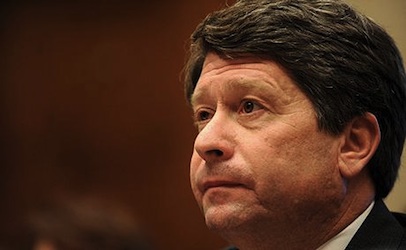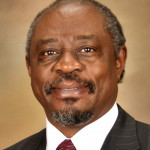The trial judge is as much on trial as the criminal defendants during an appeal, and a 97-minute session Tuesday in a federal appeals court in Atlanta was an illustration of how that system works. It came during oral arguments in the case of United States v. Michael Parnell, Mary Wilkerson and Stewart Parnell before a three-judge panel of the U.S. Court of Appeals for the 11th Circuit.
 The three criminal defendants want their convictions and sentences overturned. To succeed they’d need the appellate court to reverse one or more of the many rulings by U.S. District Court Senior Judge W. Louis Sands. He was the trial court judge, who during almost three years, presided over the complicated criminal case.
The three criminal defendants want their convictions and sentences overturned. To succeed they’d need the appellate court to reverse one or more of the many rulings by U.S. District Court Senior Judge W. Louis Sands. He was the trial court judge, who during almost three years, presided over the complicated criminal case.
There’s a significant obstacle for the defendant/appellant attorneys, and it kept coming up Tuesday in the Atlanta courtroom. The “finder of fact” in this or any appeal is the trial court judge. Appellate judges don’t make changes to the record.
Through out the most significant criminal case involving food safety in history, Sands made hundreds of decisions large and small. The case culminated in a near two-month jury trial that ended with convictions and sentencing of the trio associated with the now-defunct Peanut Corporation of American (PCA).
The government prosecuted a 76-count federal criminal indictment against the trio in Sands’ Albany, GA, courtroom. Stewart Parnell was PCA’s chief executive and Michael was his peanut broker brother. Wilkerson was quality assurance manager PCA.
The three, who were sentenced in late 2015, are in federal custody. Collectively they are serving 53 years for their roles in a Salmonella outbreak that sickened thousands and killed nine in 2008-09.
Oral arguments for the Parnells
Michael Parnell’s attorney Joseph R. Pope wasted no Tuesday painting a picture of a leading issue of the appeal before the court. He said the case against his client had improperly been depicted as a “death case” and as a “conspiracy” without any co-conspirators.

Pope, from the Williams Mullen law firm in Richmond, and Stewart Parnell’s appellate attorney Justin Lugar of the Gentry Locke firm in Roanoke,VA, both argued that jury misconduct and mistakes in applying sentencing guidelines should open their clients’ jail cells.
Jury misconduct came up following the 2014 trial after defense attorneys found out a juror had doubts about the verdict because of comments other jurors made about deaths associated with PCA’s contaminated peanut butter products.
The case stemmed from the 2008-09 nationwide Salmonella outbreak traced to peanut butter and peanut paste produced at PCA’s plant in Blakely, GA. During the trial, Sands permitted the government to put on testimony about how conditions at PCA’s plant caused the outbreak. He also allowed an expert witness to answer questions about the nature of Salmonella illnesses. But Sands did not allow the jury to hear anything about the outbreak deaths.
At least five jurors, however, went on record after the trial admitting they knew deaths had resulted from PCA’s shipments of peanut butter and peanut paste that its owner and managers knew was contaminated with Salmonella.

In 2015 Sands conducted a lengthy investigation into the possible jury misconduct. He found the story told by the juror most troubled about the situation was not shared by the others. It appears that nine of the jurors never knew about the deaths, and defense attorneys either agreed or were out of challenges when seating two others after saying they’d heard some people had died in the outbreak.
It remains a little cloudy whether the deaths were ever subjects of “jury deliberations” or just some conversations on the side. The outbreak was big news in Georgia in 2009, but the trial did not occur until five years later.
Veteran Department of Justice prosecutor John Alexander Romano contends it’s not like jurors heard a “fresh” media depiction of the case during the trial. One of the appellate judges suggested what they heard was just what family members said.
The attorneys for PCA’s one time CEO Stewart Parnell and his peanut broker brother Michael Parnell seemed most concerned about the how Sands managed to sentence their clients to 28 and 20 years, respectively, in federal prisons.
Both were moved up multiple levels under federal sentencing guidelines because of the “net dollar value” of the losses their crimes caused. About 200 companies recalled almost 4,000 food products because they contained peanut butter or peanut paste made at PCA’s Blakely plant.
Defense attorneys are questioning whether the government ever documented sufficient losses to justify the sentences imposed on the Parnells and Wilkerson. Under threat of subpoena, the FBI collected financial loss data from about 50 companies.
The trial court called a single FBI agent to the stand who introduced what the agency collected. It was an unaudited spreadsheet, which she did not analyze. Defense attorneys contrasted that proceeding with the restitution hearing held by Sands, which concluded with no dollar amount required.
Just one of the companies that had to recall product, Kellogg’s with $45.6 million in losses, would have been enough to justify the multiple level enhancement of the sentences for both of the the Parnell brothers. But attorney Pope pointed to an apparently open FBI inquiry to Kellogg’s. The information submitted by the food giant included the statement that it was “not sure if this is what you are looking for.”
In his examination of the submissions made to the FBI, Pope said: “I can’t tell you what they mean.”
Were the appellate judges to throw out the FBI’s net loss values for just being weak or inadequate work, it would likely mean homecomings for brothers Stewart and Michael Parnell.
Argument for quality assurance officer Wilkerson
Then there’s Mary Wilkerson, PCA’s then-newly promoted quality assurance manager. She was sentenced to five years in federal prison on a conviction of a single count of obstruction of justice, a process crime. The jury acquitted her on another count.
The question of whether Wilkerson should have been put on trial with the Psrnells came up during the appeal arguments. Her attorney, Albany-based Thomas G. Ledford, said he was ordered by Sands not to ask for a separate trial again.
Sands, however, removed Wilkerson from the restitution hearing on the basis that she was not part of the criminal conspiracy.

Ledford has been insistent that the DOJ has violated its electronic-discovery policies in the way that it has treated Wilkerson. Ledford is a court-appointed attorney in the hardscrabble small city of Albany, GA, who claims the government kept giving him “unsearchable” files.
“It was unreadable to us,” says Ledford. His basic claim is that DOJ provided “discoverable material” in a form that could not read or accessed. Romano says the court paid for 286 hours, or almost seven weeks, of work by an IT expert to help Ledford with the data.
Tuesday’s hearing saw a delegation of the Parnell brothers’ family members at the court, but also there was Jeff Almer, whose mother was one of the nine fatalities attributed to the outbreak.
If the government’s side is mostly upheld by the appeals judges, the approach the government took in the PCA prosecution will likely be seen again, according to food industry attorneys. It involved the use of fraud and conspiracy charges with such safe food concerns as shipping adulterated and misbranded food.
Appellate courts are not on predicatable schedules. Rulings for the appeals in this case could take days or months.
(To sign up for a free subscription to Food Safety News, click here.)
